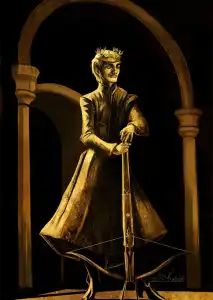Chapter 422: Good Fortune and Misfortune Go Hand in Hand |
You cheat me, I cheat you. Struggle was the theme of the era of the great powers.
In the harsh realities of global politics, nations are bound not by choice but by the dynamics of interests. Friendships and animosities are forged and broken as interests align or clash, with role reversals being a common occurrence.
The British were the best at this. They could go from being allies to enemies in a blink, and then friends again shortly after.
European diplomacy in the modern era has, to some extent, taken a page from Britain’s playbook, with nations progressively abandoning their moral boundaries and ethical standards. Genuine, close-knit alliances are now remnants of a time before the Middle Ages.
In this context, the relationships between European nations were a tangled mess that could not be simply categorized as enemies or friends.
To gain more support in the negotiations, both Prussia and Russia are conducting diplomatic offensives. The Ottoman Empire, which has been slow to react, has also launched diplomatic activities. Only the khanates of Central Asia and the Eastern Empire are still in a “salted fish” state.
TN: lazy and unmotivated; no purpose in life; someone who just lies there and does nothing
Being a “salted fish” is a tragedy. Under the European ruling system, international support is still very useful. Even the diplomatic support of small countries has value.
Since the little brother doesn’t have the diplomatic ability, John Bull himself has to step up. Perhaps this is also what the British government wants to see most so that they can increase their influence in these countries and gain greater benefits.
“The Russians want to go back to the pre-war status quo and obtain our support?”
Franz couldn’t help but be surprised. This was simply a fantasy. Whether they admit it or not, the Russians are the losers this time. How can losers not pay the price?
Not to cede an inch of land, not to pay a single ruble.
Such an armistice condition is unlikely to be agreed to by everyone. Unless they can persuade all European countries to endorse it, paying the price is inevitable.
Foreign Minister Wessenberg replied, “Yes, Your Majesty. That’s what the Russian ambassador said. They don’t want to take responsibility for this war.”
No doubt, this involved political struggles within the Russian government. No one in the higher ranks wanted to bear responsibility, so they acted shamelessly.
Franz was amused. He couldn’t be bothered to deal with the Russians’ mess, so he said without hesitation, “Reply to the Russian government that if they think they have the ability to persuade all parties to agree, we have no objection.
But if they cannot do so, then they should not entertain such whimsical ideas lest they become an international laughingstock.”
Becoming an “international laughingstock” was Russia’s Achilles’ heel. Their diplomatic blunders were never-ending, occurring every few years, as if they could not grow without creating controversies.
Franz naturally didn’t want to accompany the Russian government to have fun and treat everyone else like fools, only to find out in the end that they were the fools.
Diplomacy is based on strength, and the Russian Empire in its heyday had the confidence to do so. If they had stopped the war a year ago, they would still have had the strength to make no territorial concessions and pay no reparations.
It’s a pity that the sound of gunshots in Moscow put an end to all of this as the Russian government grappled primarily with internal threats, rendering external adversaries a mere secondary concern.
Even the most radical Polish nationalists dare not dream of swallowing the Russian Empire in one bite. When it came to military prowess, the exception of the Kingdom of Prussia notwithstanding, the rest were merely opportunists, exploiting situations rigged in their favor.
The main forces of the Russian army were preoccupied by the Prussians. Meanwhile, the enemies the others faced were all second-rate troops of the Russians. Their combat effectiveness was not in the same league.
The tragedy now is that the main forces of the Russian army are depleted, and the combat capabilities of the new recruits are at best second-rate. This is also proven by the fact that all fronts are at a disadvantage.
Prime Minister Felix analyzed, “Your Majesty, I think the Russians are probing our stance. At this point in the war, the Russian government must know they cannot continue.
The Russian Empire’s economy is on the verge of collapse, and social contradictions have long reached the tipping point. If the war is not ended, the Russian government will be finished.”
“Economic collapse, internal and external troubles,” Franz thought about it from Alexander II’s perspective. What would he do if he were in his shoes?
Franz quickly came to a conclusion — stabilize first, then reform. Never mind the rest, first, save the regime, and then use external pressure to push for social reform.
Nicholas I won the Near East War, not only covering up the social crisis but also increasing the difficulty of reform. The ruling group did not feel a threat to their survival.
Now that the situation has deteriorated, isn’t this an opportunity?
After this failure, the strength of the reformists after the war will inevitably skyrocket. Alexander II can also investigate the ones responsible for the failure of the war and take the opportunity to clean up some of the “parasites”.
If he is ruthless enough, he can also take advantage of the opportunity to suppress the rebellion to severely cripple the conservatives in the country.
This already had a precedent. More than ten years ago, it was only because of the revolutions that Austria reshuffled the cards and completed social reforms.
Franz did not doubt Alexander II’s ability at all. In the original timeline, this person completed the social reforms. Of course, there was no shortage of bloodshed and violence during this period, otherwise, he would not have been assassinated by the revolutionaries.
As an emperor, Franz knew very well how difficult it was to assassinate an emperor. Without the cooperation of internal traitors, the revolutionaries would not have been able to get close.
How else could the bombs be thrown? Especially after throwing the first one, when Alexander II checked on the injured coachman, a second bomb was thrown which killed him.
Were the guards made of wood? To allow an assassin to attack at close range and get a second chance?
There was a time gap between the bombs, meaning the thrower was only a few dozen meters away. Under normal circumstances, the assassin would either be riddled with bullets or captured alive, and there would be no chance for a second attack.
The surrounding crowd would also be immediately cleared and controlled. The assassination attempt is obviously covering up something, and it is very unreasonable to analyze it simply from the surface.
Based on the state of his own security, Franz can conclude that there is no traitor and that the assassin would not have been able to approach him with a gun or bomb.
His security retinue would prohibit strangers from drawing near. Even in choreographed political displays, those permitted to approach the emperor would have undergone comprehensive ancestral investigations across several generations, verifying the absence of potential perils.
In Russia, a country with a strict class hierarchy, it was difficult for commoners to even approach nobles, let alone get in close proximity to the emperor.
Not to mention one or two assassins, even a group of assassins might not be able to get within a few dozen meters.
Franz was too lazy to dwell on these questions any further. Anyway, he just had to be careful himself. Even when he was active in Vienna, he was accompanied by hundreds of guards and thousands of police officers securing the perimeter.
The security was absolutely top-notch. Even if there were assassins, they could only retreat obediently when they saw this lineup.
There was no such thing as traveling incognito. Monarchs who traveled in a carriage with a few guards only existed in small countries. They couldn’t afford luxury, so they could only make do.
Franz said with a grin, “It seems that Alexander II is about to make a big move. I’m afraid he is deliberately indulging the bureaucracy to lull these people into a sense of complacency.
A major purge of the Russian government is imminent. My guess is Alexander II will launch a coup to clear out the government of its parasites, then pin the blame for the war’s failure on them.
This will kill many birds with one stone. Not only can it clean up the ‘parasites’, but he can also take the opportunity to suppress the conservatives and give the people an explanation.
Once the corrupt officials are cleaned up, the rebels will have no excuse to rebel. It won’t be long before the rebels are embroiled in internal strife. If the revolutionaries don’t run away quickly, they might even be captured and presented for merit.”
The revolutionaries had shallow foundations. Although they made quite a ruckus, in this era, any revolutionary party in Russia had only about a hundred or so people.
They only united temporarily to seize power. If they were not too weak, they would not have accepted the banner of “clear the emperor’s side and purge the corrupt officials.”
While this banner has united many people, it has also brought about a problem. As the uprising army grew in size, the revolutionaries lost control of the army.
With the “corrupt officials” punished, the public’s grievances would be addressed and many would want to withdraw. Put simply, many joined the uprising solely due to heavy taxation.
Alexander II could solve the problem with a few decrees. By pushing the blame onto the bureaucracy, the people’s grievances would be vented, and the Tsar would still be a good Tsar.
The people’s hearts are still with the Tsar, and the army supports the Tsar. Neither the reformists nor the conservatives of the nobility have any intention of overthrowing the Tsar.
Including the newly rising capitalists, these people also believe that it is better to keep the Tsar than not to have him. They support the revolution only to seize power, not to carry out a real social revolution.
In a country where more than 99% of the people support the Tsar, is it not nonsense to try to overthrow the Russian government?
In this respect, Alexander II was born in a good time and place. The Russian revolutionary leaders have not yet been born, the proletarian revolutionary party is nowhere to be seen, and the current bourgeois revolutionary groups are not anti-imperialist.
If the time were pushed back fifty years, or if the background were changed to France, the country would have been a republic by now.
Prime Minister Felix disagreed, saying: “Reform is not that easy. The conservative forces in the Russian Empire are very strong. Even Nicholas I failed to complete the social reforms, and it will be even more difficult for Alexander II to do so.
All he can do now is probably to carry out limited reforms, transform the feudal system of the Russian Empire, and improve its strength in the short term.”
He has the right to speak. During the Austrian reforms, the Hungarian nobility completely lost their voice, the conservatives in Vienna were swept into the trash heap by the rebels, and the rebels scattered the conservatives in Bohemia.
By the time the Austrian government announced the reforms, the conservatives’ power was less than one-tenth of what it had been, and most of them had lost their foundations.
Even so, there has been no shortage of struggles between the two sides in the past ten years.
Now, the Russian government cannot rely on rebels to clean up the conservatives. The Tsar himself needs to take the lead. This wave of hatred alone is enough to give Alexander II a headache.
This was an indication of a prolonged clash between reformist and conservative ideologies, exacerbated by the deeply entrenched currents of hatred. Even with the tsar’s backing, the reformists’ influence would be hard-pressed to eclipse that of the conservatives in the immediate future.
Beholden to the customs of Europe, Alexander II confronted an inescapable reality: the purging of the nobility, while permissible, did not grant him the authority to eliminate them in their entirety.
The crime of corruption and bribery is too light. For nobles, it can only be considered a minor offense. Even if it involves military supplies, at most a few people in charge can be killed.
Most people will only be sent home or exiled to Siberia. These people might lose their power but they would still be alive, which was a hidden danger.
Meanwhile, the rebels in Moscow were very disappointing and didn’t make any waves. No major nobles or capitalists were involved at all, and it was impossible to implicate them.
“Clear the emperor’s side and purge the corrupt officials” is inherently lower than rebellion. Even if it is just a show to prove the emperor’s benevolence, Alexander II must issue an amnesty order.
The revolutionaries are the scapegoats. As long as the rest of the people are smart enough, they can decisively choose to defect after Alexander II issues an amnesty order. At most, they will be marginalized after the war, and they will not be purged.
This means that the conservatives have only lost in the political struggle, and their strength has not been greatly damaged.
After all, just like Austria, the Russian Imperial Army is also dominated by nobles, and the Tsar cannot violate the established rules.
Franz nodded and said, “For the Russian Empire, limited social reforms are enough to create a world power.
They have a vast territory, rich resources, and a large population. As long as they complete industrialization, they will be a European superpower.
If they really carry out thorough social reforms, it will not be a good thing for us. You know, on the European continent, the only country with greater development potential than us is the Russian Empire.”

















